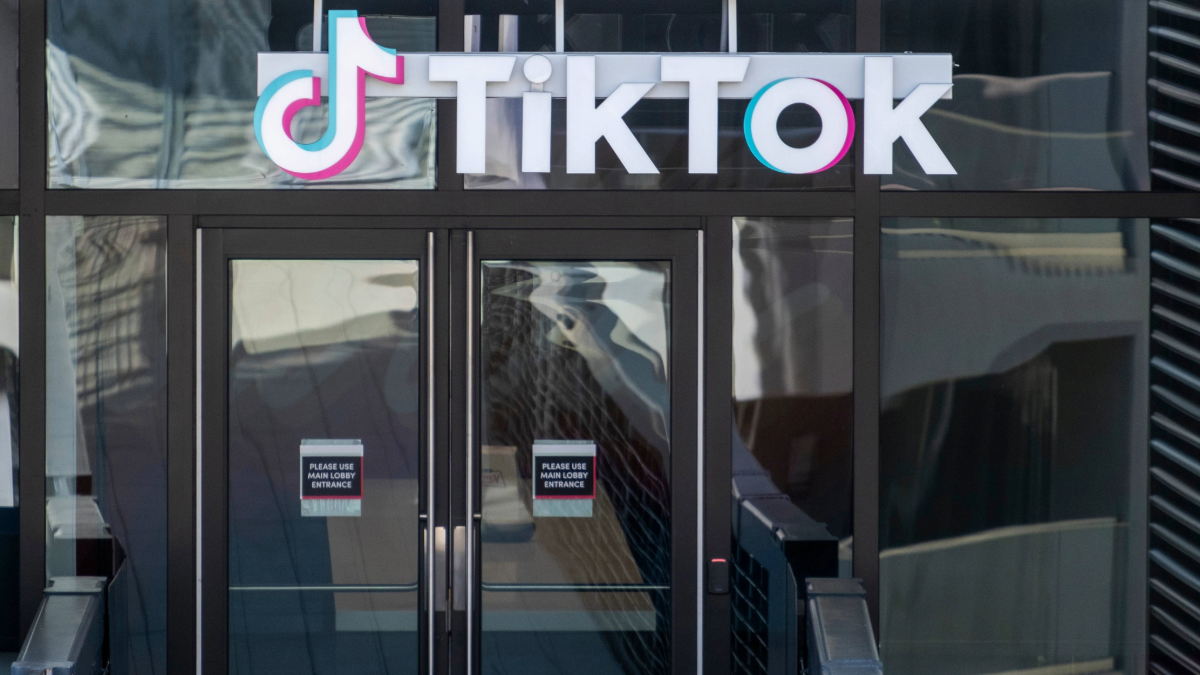The US Government Must Show Its Cards on TikTok
Justin Hendrix, Ben Lennett / Apr 23, 2024
TikTok's offices in Menlo Park, California. Shutterstock.
On Saturday, the US House of Representatives passed a measure that would force Bytedance, the Chinese company that owns TikTok, to sell the app or face a ban. Today, the Senate is expected to take up the matter. If it passes in the upper chamber, President Joe Biden has indicated he will sign it into law. Before that happens, lawmakers owe the public far more detail than has been provided about the nature of the national security threat they say is motivating their rush to take action against a digital media application used by 170 million Americans.
TikTok: A Chinese weapon?
Lawmakers who support taking action against TikTok say the intelligence case is clear: the app represents a data security threat and is a vector for Chinese propaganda. Senators were recently treated to a classified intelligence briefing on the subject and appear to find the evidence convincing. For instance:
- Sen. Mark Warner, the chair of the Senate Intelligence Committee and organizer of the closed-door briefing, said last month that "if you don't think the Chinese Communist Party can twist that algorithm to make it the news that they see reflective of their views, then I don't think you appreciate the nature of the threat.” He added that TikTok is perhaps "the most powerful propaganda tool ever." Sen. Warner was joined by his Republican counterpart on the Intelligence Committee, Sen. Marco Rubio (R-FL), in issuing a joint statement supporting the initial House legislation.
- Senate minority leader Mitch McConnell (R-KY) said earlier this month that TikTok is "a tool of surveillance and of propaganda” and that it represents a “matter that deserves Congress' urgent attention.” He says, "requiring the divestment of Beijing-influenced entities from TikTok would land squarely within established constitutional precedent."
- Sen. Eric Schmitt (R-MO) called the Senate intelligence briefing “disturbing.” He said China’s "ability to track, their ability to spy, is shocking... I think we have to come to the realization that China – this is a brutal dictatorial regime that has concentration camps in their country, and they're hell bent on world domination.”
- After the briefing, Sen. Brian Schatz (D-HI) said, “I am no longer undecided. I think we have to go through with this, whether that’s the House version or we have to conference like grown-ups.” He added that he is “satisfied that this is a real national security concern and not a cooked up one.”
That sounds scary. But what is in the public domain about the threat is largely hypothetical, at least according to key leaders in the intelligence community:
- In a March 2023 hearing of the House Armed Services Subcommittee on Cyber, Information Technologies, and Innovation, General Paul Nakasone, head of the National Security Agency and US Cyber Command, and John Plumb, Assistant Secretary of Defense for Space Policy and Principal Cyber Advisor to the Secretary of Defense, pointed only to hypothetical risks of TikTok. Plumb referred to “TikTok as a potential threat vector,” while General Nakasone said he has “concerns” about the app.
- In a House Intelligence Committee hearing in March 2024, Office of the Director of National Intelligence Director Avril Haines was asked by Rep. Raja Krishnamoorthi (D-IL) whether China could “use TikTok as a platform to influence 2024 elections,” to which Haines replied, “We cannot rule out that the CCP could use it, correct.”
- And in a March Senate Intelligence Committee hearing on worldwide threats, Sen. Rubio questioned FBI Director Christopher Wray about TikTok. Sen. Rubio presented the FBI Director with a set of possible threats TikTok might pose, which Wray agreed were plausible. But he offered little in the way of direct proof, suggesting that the difficult thing about the kinds of tactics Sen. Rubio fears is that they are “extraordinarily difficult to detect, which is part of what makes the national security concerns represented by TikTok so significant.”
Indeed, these tactics would appear to be so difficult to detect that no one has appeared to detect anything solid. There is little evidence to date that TikTok has been any more of a channel for Chinese influence to reach Americans than the other major social media platforms. And when it comes to surveillance, lawmakers and TikTok’s detractors often point to a Chinese law they say would require the company to turn over data on Americans to Chinese intelligence services. Few seem satisfied with the company’s claims to have created a firewall between ByteDance and TikTok data, which the company named Project Texas.
But there is no indication that TikTok data is any more useful to Chinese intelligence than any of the rest of the personal information sloshing around on the internet, whether acquired by purchase or scraping. Heeding those realities, a little over a week after the initial vote by the House on a TikTok bill, it unanimously passed another bill that “makes it unlawful for a data broker to… make available specified personally identifiable sensitive data of individuals who reside in the United States to North Korea, China, Russia, or Iran or an entity controlled by such a country…” Relatedly, the Biden Administration issued an executive order in March 2024 authorizing the Department of Justice (DOJ) and other federal agencies to take steps to prevent “the large-scale transfer of Americans’ personal data to countries of concern.” Those policies, along with stricter limits on data collection by all tech platforms, would more directly address the very real threat of foreign governments accessing American’s personal data and information.
The legal challenges are already being written
One thing is certain, though. If the measure becomes law, it will be challenged on First Amendment grounds. At an event hosted at the Berkman Klein Center for Internet and Society at Harvard University, Georgetown law scholar Anupam Chander predicted the case would end up in the Supreme Court. Arguments that invoke the First Amendment almost write themselves.
“I think the appropriate standard is actually even more than strict scrutiny,” said Jenna Leventoff, senior policy counsel at the American Civil Liberties Union (ACLU), at the Harvard event. “This is a prior restraint. This is stopping the speech of 170 million Americans before they can say anything…. It is the most strict speech-restrictive thing that you can possibly do.”
A preview of sorts happened last year in Montana. In May 2023, the governor of Montana signed a bill (SB 419) prohibiting TikTok from operating within the territorial jurisdiction of the state. In response to the law, TikTok filed a complaint against Montana's attorney general in federal court, challenging its constitutionality. The complaint alleged that the "ban abridges freedom of speech in violation of the First Amendment, violates the US Constitution in multiple other respects, and is preempted by federal law." In November 2023, US District Court Judge Donald W. Molloy ruled in favor of TikTok, granting a preliminary injunction preventing the law from going into effect.
With respect to evaluating the First Amendment claims of TikTok’s suit, the judge found that “even applying intermediate scrutiny, the State fails to show how SB 419 is constitutionally permissible.” According to the decision, “To pass intermediate scrutiny, a law must both ‘advance[] important governmental interests unrelated to the suppression of free speech[,] not burden substantially more speech than necessary to further those interests…’ and ‘leave open ample alternative channels for communication of the information…’.” Overall, the court found the law “is not narrowly tailored, nor does it leave open any alternative channels for targeted communication of information.” Moreover, it found that the ban would not alleviate data security concerns or “harms in a direct and material way” given the other avenues for the Chinese government to gather data from Montanans.
If the federal government is to have any hope of defending the measure that lawmakers appear set to pass, it will likely require it to prove the potential national security risk in much more detail than it has done to date. Therefore, it is incumbent upon lawmakers to seek the declassification and urgent publication of as much of the intelligence related to TikTok and its potential use as a tool by the Chinese government as possible. The public deserves more than hypotheticals, and eventually, a court will demand the specifics.
In March, Sen. Warner told reporters he supported declassifying some of the analysis communicated in the intelligence briefing provided to his Senate colleagues, according to NPR. Perhaps things didn’t go according to the timeline the Senate anticipated – Sen. Schumer had indicated the Senate would take things slowly after the House passed the initial bill, before House Speaker Mike Johnson bundled it with must-pass military aid. But now, time is short to declassify the intelligence. The public should see it before the legislation reaches the President’s desk.
Resources:
- TikTok and National Security. Dr. Milton L. Mueller and Dr. Karim Farhat, Georgia Institute of Technology, School of Public Policy, Internet Governance Project. (January 8, 2023)
- Lawmakers say TikTok is a national security threat, but evidence remains unclear. Brian Fung, CNN (March 21, 2023)
- TikTok: Recent Data Privacy and National Security Concerns. Congressional Research Service (March 29, 2023)
- TikTok: Hate the Game, Not the Player. Rose Jackson, Seth Stodder, Kenton Thibaut, DFRLab (February 14, 2024)
- TikTok and National Security. James Andrew Lewis, Center for Strategic and International Studies (March 13, 2024)
Authors

